What is the name of the disease, when eyes look in different directions?
When the eye muscles work poorly, the apples with which the rotational movements are performed are not positioned correctly. It turns out that the eyes are looking in different directions. This disease is called strabismus and can manifest itself at any age. Children's pathology is treated much easier and faster, in adults - longer and more difficult.
Description of strabismus
Strabismus is when the eyes are looking in different directions. And this can be manifested in different ways. For example, one person's eyes can converge at the nose bridge at the same time, the other one looks directly, and the second - aside. Most often, strabismus appears in childhood, but can develop in adults.
Infants sometimes have a false form of the disease. The nose of a newborn is still underdeveloped and usually quite flat. On the bridge of the nose on both sides there are additional skin folds. They partially cover the kid with a view. And it creates a feeling that the child's eyes are beveled to the bridge of the nose. Over time, additional folds disappear, the spout forms, and the symptoms disappear.
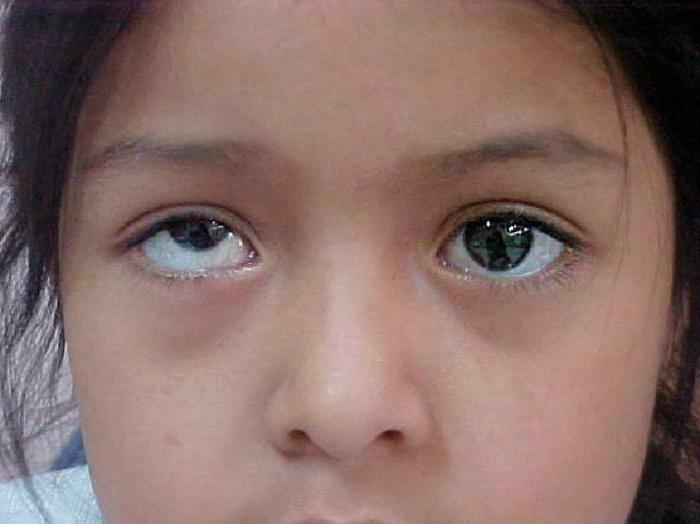
Types of the disease
Strabismus is called when looking at the eyes in different directions. The disease has two main types. Strabismus can be paralytic when the muscles stop moving. This can happen due to trauma, disruption of the nervous system. Most often, only one eye is affected.
The second kind of strabismus is called friendly. It manifests itself when a person looks immediately in all directions. Such eyes are a deviation from the norm. This type of strabismus is most common in childhood. The cause can be any progressive eye disease.
Strabismus can have several additional types:
- mixed - when there are several forms of deviations;
- converging - in this case the eye constantly approaches the bridge of the nose;
- divergent - the apple deviates to the temple;
- vertical - with the eye looking down or up.
Strabismus can be both permanent and periodic. To determine the type of disease, ophthalmological examination is performed, different tests are made. 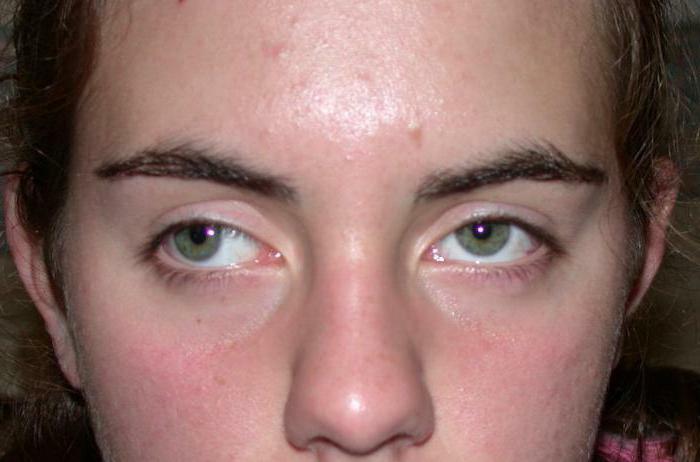
Causes of
Why do eyes look in different directions? Strabismus can be congenital or acquired. In the first case, the cause is heredity. The disease usually begins in the womb or the baby gets a pathology at the genetic level.
The causes of acquired strabismus are:
- vision drop;
- infectious diseases;
- disruption of the central nervous system;
- physical or mental trauma;
- tumors;
- meningitis;
- influenza;
- stress;
- strokes;
- paralysis;
- measles.
The cause of strabismus can be excessive physical or visual stress. Especially if the work is connected with computers or places where you need to strain your eyesight. Causes of strabismus can also become diseases of the thyroid gland, diabetes mellitus, hypertension. Sometimes pathology occurs due to cataracts or retinal pathologies. 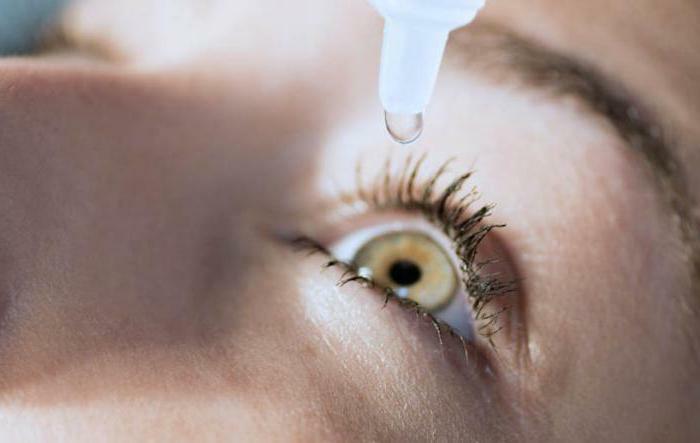
Symptoms of the disease
Why are the eyes in different directions? This disease is called strabismus. His symptoms are quite simple: his eyes are looking in different directions. Exception - children under one year. In this period, a false strabismus may be observed. The reason for which the eyes are directed in different directions can be the individual structure of the visual organ. The eyeball deviates all the time. In this case, a survey is required. It is possible that a person simply looks at the other side.
The goals of strabismus treatment
There are three main goals of strabismus treatment. Therapy is carried out to keep a person's eyesight, align eyeballs or synchronize their work. To achieve these goals, glasses, dressings and surgical operations are used. Obtained strabismus in adults is most often due to lack of timely treatment.
Therapeutic treatment
If the eyes are directed in different directions, this does not mean that a surgical operation is required immediately. First, therapeutic methods are used. If the strabismus arose against the background of a specific disease, then the treatment is directed primarily at him. If you do not start therapy on time, then a person may completely lose sight. 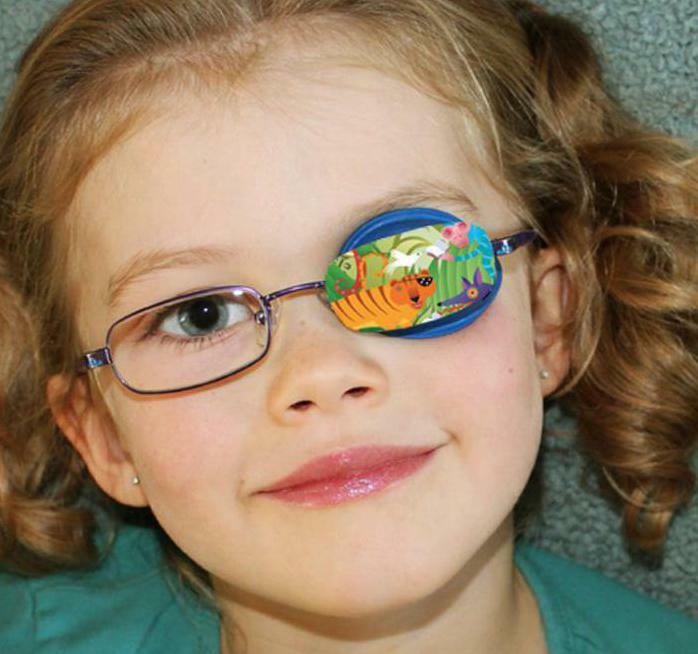
In any case, eye correction is performed first. Earlier only glasses or special prismatic lenses were available. In modern times, soft contact lenses are also used for correction. Laser therapy is very popular. It is not only painless, but also very effective. For the correction of vision, diplomatic, hardware and orthoptic treatment is used.
If amblyopia develops, penialisation is prescribed( temporary closure of a healthy eye).The corresponding eye socket or eyeglass lens is sealed. This is done to increase the load on the muscles of the mowing eye.
Amblyopia is performed for a long time. During treatment, the patient should be under constant supervision of physicians. During an increase in the load on the diseased eye, vision begins to gradually recover, the strabismus disappears.
For his treatment, special exercises are prescribed. The technique of Dr. Bates, an American ophthalmologist, is very effective. His exercises can help even in the event that, it would seem, there was only one way out - a surgical operation.
There are various exercises of authorship of other professors( Roy, Zhdanov, Shichko, etc.) that help restore normal vision. Many techniques are very effective at the first signs of strabismus. The started disease is treated much longer and more difficult. 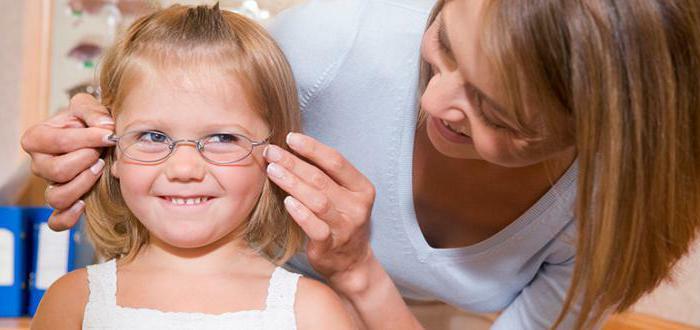
Surgical operation
If the above therapeutic methods have not helped, and eyes are still directed in different directions, a surgical operation is prescribed. It is done under local anesthesia. But if the operation is prescribed to the child, general anesthesia is used.
Even after recovery and full recovery of vision, certain rules must be observed. With prolonged visual exertion, a mandatory break takes place every 45 minutes. Children should not be allowed to watch TV for long, sit at a computer, in front of a tablet. You need outdoor exercise, eye exercises and a healthy diet.
Improved and restored vision takes a long time. Can pass from 2 to 3 years. It is very important to start treatment on time. In childhood, therapy helps much faster. Strabismus does not pass by itself. Corrective glasses and supervision of the ophthalmologist are necessary.
